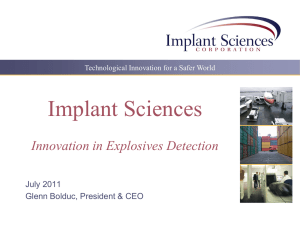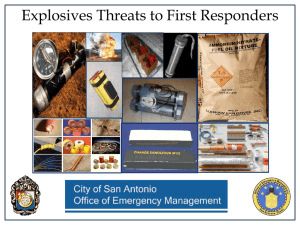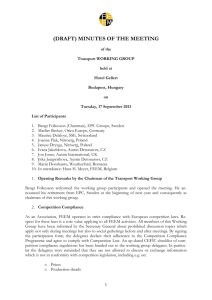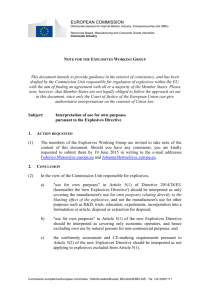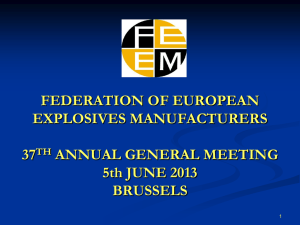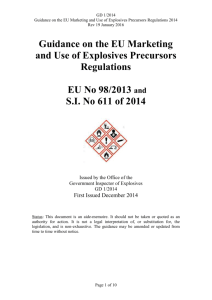Commission Directive 2008/43/EC setting up a system for the
advertisement
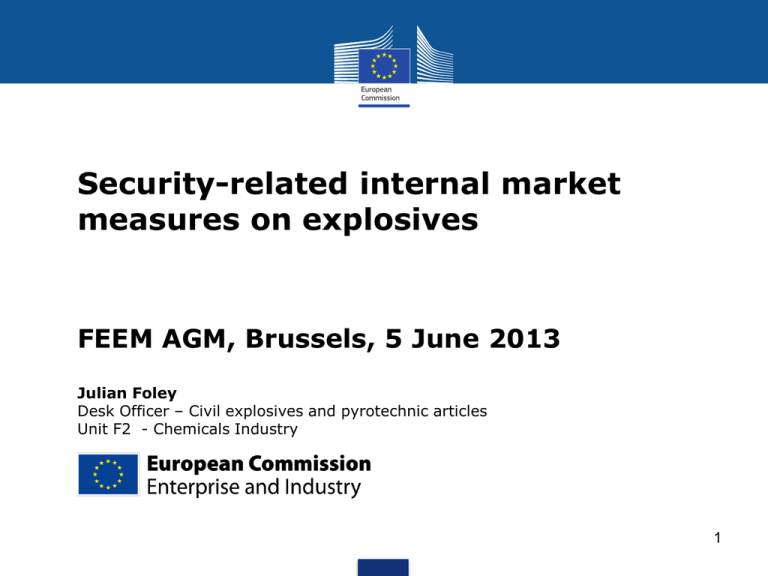
Security-related internal market measures on explosives FEEM AGM, Brussels, 5 June 2013 Julian Foley Desk Officer – Civil explosives and pyrotechnic articles Unit F2 - Chemicals Industry 1 Overview • Regulating commercial explosives on internal market: • • • Implementation of Council Directive 93/15/EEC on the harmonisation of the provisions relating to the placing on the market and supervision of explosives for civil uses Commission Decision 2010/347 amending Decision 2004/388/EC on an Intra-Community Transfer of explosives document Commission Directive 2008/43/EC as amended by Directive 2012/4/EU setting up, pursuant to Council Directive 93/15/EEC, a system for the identification and traceability of explosives for civil uses Explosives Action Plan • Adaptation of Explosives Directive to New Legislative Framework for the marketing of goods on the internal market • Implementing Regulation 98/2013 on the marketing and use of explosives precursors • Outlook 2 Purpose of Diredtive 93/15/EEC • To establish a single market in the EU in trade of explosives for civil uses • To harmonise the safety requirements for civil explosives at a high level of protection • To establish an administrative system for the supervision of transfers of explosives and ammunition 3 Single market aspects • Explosives placed on EU market must conform to essential safety requirements • If products conform, they receive a “CE marking” and can be placed on the market anywhere in EU 4 Security aspects • Explosives covered by 93/15 may be transferred only in accordance with the provisions contained in Article 9 • Member States shall ascertain whether undertakings in the explosive sector process a system for keeping track of explosives so that those holding explosives can be identified at any time • Companies shall keep corresponding records of their transactions (Article 14). 5 EU Action Plan on Explosives • Explosives Security Experts Task Force - draft report by May 2007 Adoption of the Action Plan in April 2008 48 actions: - horizontal measures - prevention - detection - response 6 • Decision 2004/388/EC on an Intra-Community Transfer of explosives document 7 Amended by COMMISSION DECISION 2010/347/EU • Use of electronic system (SCEPYLT) • Enable competent authority of the Member State of origin to print out all necessary documents and issue the intra-Community transfer of explosives document to the supplier • after it has verified that all competent authorities of the Member States concerned have given their approval to the transfer 8 SCEPYLT Status Hosted in Spain, under the responsibility of the Ministry of Interior/Guardia Civil • 12 Member States participated (ES, UK, IT, DE, BE, NL, PL, PT, DK, LT, SI, FR) • Approx 2 million euro DG Home Funding • System currently being used by - 6 Member States (BE/DE/NL/FR/ES/PT) • Future support 9 Unique identification and traceability of explosives for civil uses - Commission Directive 2008/43/EC • Most stringent labelling requirement worldwide, allowing traceability of every single article from their production through the entire distribution chain until final use. • Easier to notice disappearances of explosives. • Faster identification: it can today take up to two days in order to identify the origin of the explosives. 10 Commission Directive 2012/4/EU • Extends the deadline for the implementation of the Directive to April 2015 as far as the entire supply chain is concerned. • For manufacturers and importers of explosives, the marking obligation already starts in April 2013 in order to ensure that by 2015 all stocks are marked with the unique identification. 11 Guidelines, etc • Close cooperation with industry on: • FEEM European Explosives Code • FEEM technical guidance document on small articles • Q and As on DG ENTR website 12 Adaptation to New Legislative Framework Proposals: • Electrical equipment designed for use within certain voltage limits COM(2011)773 • Electromagnetic Compatibily - COM(2011)765 • Explosives for civil uses - COM(2011) 771 • • • • • Lifts - COM(2011)770 Simple Pressure Vessels - COM(2011)768 Measuring Instruments - COM(2011)769 Non-automatic Weighing Instruments Directive COM(2011)766 Equipment and protective systems intended for use in potentially explosive atmospheres - COM(2011)772 • Pyrotechnic Articles - COM(2011)764 13 Adaptation to New Legislative Framework • Point 2.4.1 of AP: Ensure that each Member State has formal systems for authorising, regulating and licensing the manufacture, storage, sale, use and possession of explosives including by private persons • reflected in Article 15a and definition of economic operator of Commission Proposal on Explosives 14 Regulation on the Use and Marketing of Explosives Precursors • No 98/2013 of 15 January 2013: - a ban to introduce, make available, possess and use seven chemical substances above certain concentration limits by private individuals - exceptions on a basis of: - a system of licensing - a system of registration of transaction - obligatory system of reporting suspicious transactions Guidelines to be issued by the Commission 15 Outlook • New CBRNe Agenda • Further work on implementation of Explosives and Pyrotechnic Articles Directives • Implementation of Explosives Precursors Regulation in the SCP (with DG HOME) • Work with the private sector (FEEM, UEPG, etc) on enhancing security (voluntary codes etc.) • Facilitating work on database of commercial explosives (EDEX) 16 Thank you for your attention! Julian Foley Policy Officer Unit F2 Chemicals Industry DG Enterprise and Industry European Commission http://ec.europa.eu/enterprise/sectors/chemicals/documents/specificchemicals/explosives/index_en.htm julian.foley@ec.europa.eu 17
